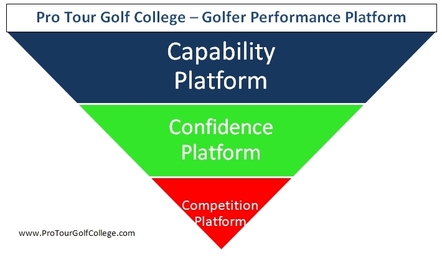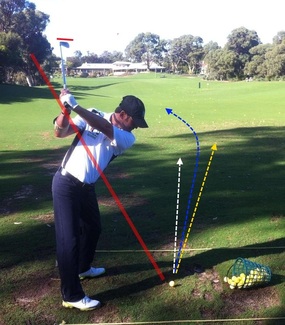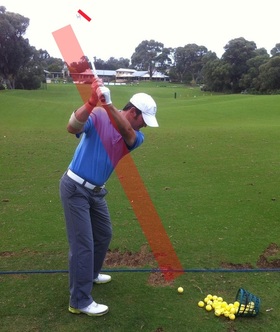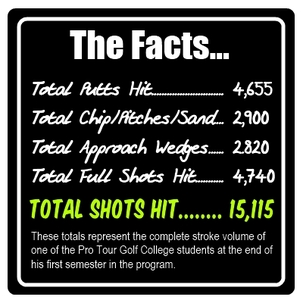|
Knowledge, Understanding, Wisdom: Knowing the difference is what makes the difference.  The difference is simply this: to know something is only that, knowledge. To understand something is to be able to act on that knowledge, being able to use it practically. Then comes the wisdom to know when to act on that understanding or not. With the complexity of the golf swing, one of my biggest drawbacks has been correctly translating the knowledge I had learned during the lesson and what worked on the driving range to the golf course. My issues were always the same; scoring in competition would go from one extreme to another, one round shooting 69, the next 78. The days my short game and putting was on, I shot low. When I struggled with the short game, the inconsistency of my long game would drive my score way up. Over the years, I had constantly adjusted my fundamentals (posture, alignment, grip and ball position) to correct my ball flight. Whilst this would work for the short term and I would play ok, they did not enable me to make any significant game improvements that I could understand and use consistently. I was wise enough though to realise that if I wanted to succeed at the highest level, I needed to make major changes to enable consistency in ball flight that would ultimately lead to game improvement and consistency. I believed that to improve, I had to find that perfect swing.  However, after years of searching and jumping from one set of instruction to the next, sometimes unavoidable due to my previous career. I slowly came to realize that there is no such thing as the perfect swing, except if we mean a swing that we can reproduce consistently and play the game to our best capability. Yet virtually all golf instruction is centred on developing that ever-elusive perfect swing and I have been as guilty as the next person to have followed that route. Perfect swings don't equal perfect performance. What then does you may ask?... The answer - your Low Competitive Score Average Beginning with the destination in mind - successfully competing on Tour My search for that elusive formula for success and the competitive edge over my playing partners now had a new purpose and a new direction. The objective was to find an institute that could meet the goals of:
 After much thought and hours spent reviewing a vast amount of instructional content on the internet, I finally settled on Pro Tour Golf College (PTGC). This decision was solely based on their instructional philosophy. Claiming that they would show you how to lower your competitive scoring average, develop your critical skills and knowledge pathway, including the competitive mind-set you need to cultivate to make the transition from amateur golfer to professional golfer. A very bold statement! Therefore, I had high expectations that their program could seriously improve my competitive performance and assist me in reaching my goal of playing competitive golf on Tour. After spending 4 weeks in their program, I was not left disappointed. Like all new students entering the program, the starting point during the first week included a detailed assessment of my current skill level. This assessment ran concurrent with the daily practice program and included full swing technique, short game skills, on-course assessment and in my case, equipment evaluation. I was extremely excited to get started on my quest but knowing where the state of my game was, the thought of being placed under the microscope so early on did leave me feeling very apprehensive. However, I had no time to fear the outcome or the results if I was to benefit from Lawrie and David's experience or their unique program.  The first week disappeared in a flash, raising many challenges along the way and did leave me feeling a little exposed. Nevertheless, what really fascinated me, was how "radically" different their training model was over everything else I had previously attended. Not so much the actual instruction, but the format. There was no standing in one place repeatedly hitting the same golf shot over and over again, as I had been exposed to in days gone by. No use of video tools, unless they were necessary which was a new phenomenon. No looking at the swing in slow motion or in key positions with lines drawn here, there and everywhere. There was no attempt to clone me or my swing to look like one of the in vogue players of today or yester-year. It was very clear from the start that I was not here to develop the golf swing in the usual manner. Instead, I was presented with differing challenges and a variety of shots and putts to not only keep practice interesting but the results would ultimately define my program of improvement.  The Transformation - Re-engineering the mind, swing and score Exposure to this interesting and unique training environment clearly highlighted my current lack of capability as I predicted it would. But, what surprised me most about using their training model was how mentally challenging the whole process had been. Practice had for the first time a real intensity and a purpose. Every shot had a meaning; it counted. If I was serious about wanting to improve, my development needed to be measurable. The results as mentioned before ultimately would shape the desired pathway to improve my technical proficiency and lower my competitive score average. When Lawrie discussed his findings, I was relieved to hear that the improvement plan would not include pulling my swing apart but would aim to work towards establishing a golf swing that could consistently:
 The main emphasis during my time at PTGC concentrated on altering my technical flaws to meet the above factors and Lawrie’s first step was to thoroughly discuss in detail the physics, geometry, cause and effects of what I was doing incorrectly. I welcomed this new approach with open arms and with his ability to break down the swing this way allowed me for the first time to understand the mechanics required to produce consistent and solid contact. At no time did I find his explanations complicated or feel overwhelmed with dozens of things to think about. In fact, they were rather obvious when explained. By the end of the review I clearly knew why the faults were occurring and truly understood why I was trying to do something a certain way. Once satisfied that I understood the changes we had to achieve the remainder of the time spent at PTGC included the process of re-engineering the swing whilst developing my capability platform (technical skill development). Outside of the normal programme, Lawrie set aside time to work closely with me on each stage of the swing, either discussing or designing techniques for me to use. We found that identifying and working on a limited number of swing alignments each week, then reinforcing them for 2 hours each day was perfect for my situation. Clearly it would take longer to remedy my swing map than the time we had available but by identifying the correct set of alignments, I would effectively be able to translate what I was learning. I knew what to practice and understand what to look for.  The upshot of my technical assessment and the changes we introduced are explained in detail on the PTGC blog http://www.protourgolfcollege.com/1/post/2012/05/golf-on-tour-how-a-scratch-handicap-golfer-improved-his-golf-swing-faster.html Alongside improving the technical aspects of my swing during my time at PTGC, the most valuable lesson Lawrie provided me with is a better understanding of the entire swing, specific to my swing type and build. I continue to use Lawrie’s prescribed swing alignments in daily practice and have started to develop a more repeatable swing that after several months now feels natural to the point where I can tell when I am getting out of sequence. I have made significant progress over the last couple of months and I am now able to diagnose the poor shots immediately on the course and make the proper swing corrections, or at least understand why.  Conclusion After spending too many years in the pursuit of better ways to improve and the realisation, that perfect golf swings do not produce perfect golf scores was the catalyst that finally brought about my change of direction. The key to further developing my game could no longer entail practicing what I believed I already knew - but to learn new skills and techniques, embrace new ways of training then learn how to best to take these out on to the course. The path I had been following was obviously leading nowhere. There was no quick fix, no shortcut to success. My knowledge and understanding of what I was trying to improve was drastically wrong. I clearly had to change the training model I was following if I wanted to see results. I therefore feel very fortunate to have been involved with the program at Pro Tour Golf College. I am confident that Lawrie and David’s approach at evaluating, adjusting and systematically developing my swing, short game skills and mental approach to tournament play will prove the correct pathway to success. Not only are my performances steadily improving as I apply their theories and techniques, I now know that I have the support of 2 highly experienced and motivated professionals who take genuine delight in seeing their pupils improve and grow in confidence.  Their objective of building a highly personalized and balanced pathway of improvement, that allows the professional or elite player to increase their confidence and competitive toughness whilst driving down their competitive score average works. There is no shortcut to success: results = knowledge + understanding x effort! Every golfer dreams of success, and I'm certainly no different. I may have had a clear vision, but without a detailed, highly personalized plan, it could all just have ended as a pipe dream. Which is why becoming a student of the Pro Tour Golf College (PTGC) has provided me with the foundations and scoring skills to springboard my professional career. David Domanski - Trained with Pro Tour Golf College May/June 2012
Suzy Montague
5/8/2012 11:42:29 am
You have truly captured what Pro Tour Golf College is all about. Helping others to make there dream a reality. 24/8/2012 10:35:10 pm
Great information about the Training to Become a Successful Touring Professional. I think people should like it . I like this information too and also i am waiting for some new updates. Comments are closed.
|
Archives
June 2019
|
Proudly Supported By
Copyright © 2011 - 2018 Pro Tour Golf College
Website Managed By Golf Performance Media
All Rights Reserved
Website Managed By Golf Performance Media
All Rights Reserved

 RSS Feed
RSS Feed



